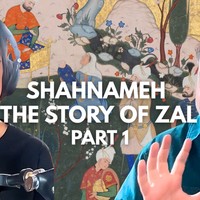

#6213
Mentioned in 7 episodes
Shahnameh
The Persian Book of Kings
Book • 1010
The Shahnameh, composed by Ferdowsi between 980 and 1010 AD, is the world's longest epic poem created by a single poet.
It narrates the history of the ancient kings of Iran, divided into three cycles: the mythical past, the time of legendary heroes, and the recorded histories.
The poem consists of over 50,000 rhyming couplets and includes stories of heroic kings, legendary heroes, and encounters with various mythical creatures.
It is a central work in Persian literature, emphasizing themes such as justice, legitimacy, and divine glory.
It narrates the history of the ancient kings of Iran, divided into three cycles: the mythical past, the time of legendary heroes, and the recorded histories.
The poem consists of over 50,000 rhyming couplets and includes stories of heroic kings, legendary heroes, and encounters with various mythical creatures.
It is a central work in Persian literature, emphasizing themes such as justice, legitimacy, and divine glory.
Mentioned by
Mentioned in 7 episodes
Mentioned by 



Dominic Sandbrook

268 snips
560. The Golden Age of Japan: Lady Murasaki and the Shining Prince (Part 1)
Mentioned by 



Anita Anand

40 snips
105. The Last Great War of Antiquity
Mentioned by ![undefined]()


Thomas Banks

32 snips
Episode 262: "Much Ado About Nothing" by William Shakespeare, Acts 2 & 3
Discussed as the magnum opus of Ferdosi and an important text that preserves the Persian language.

15 snips
Culture | Ferdowsi's Shahnameh, Part 1
Mentioned by ![undefined]()


Parneon Sadegi

13 snips
Persian poetry and politics
His poem about the history of pre-Islamic Iran, written around the year 1000, became canonical.

Michael Cook, "A History of the Muslim World: From Its Origins to the Dawn of Modernity" (Princeton UP, 2024)
Mentioned by ![undefined]()


Kaveh Akbar

Kaveh Akbar's novel 'Martyr!' is a journey of identity, addiction and poetry
Erwähnt von Musa Celik als wichtiges Werk der persischen Literatur, das iranische Mythen und den Namen Nouruz beinhaltet.

Nouruz - Das persische Neujahrs- und Frühlingsfest





